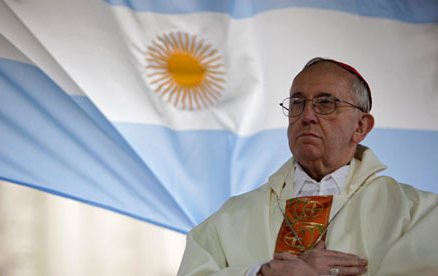What Was Pope Francis" Role in Argentina's Secret War?
By Jeff Raines
Unfortunately, we live in a world where tragedy, death, and violence continue to hurt those around us. And when these events happen we are left wondering in what ways could we have done more, what we could have done better, and who we can blame for a lack of greater action. This time the target of blame is Pope Francis I, the 266th pontiff on the Catholic Church, and a man formerly known as Cardinal Jorge Mario Bergoglio from Argentina. It is unfair to say Bergoglio did not do enough during a military regime so terrible that as many as 30,000 people disappeared or were killed during the "Dirty War." From 1976-1983, the military junta that controlled Argentina sponsored terrorist activities for fringe military groups in support of the regime. This led to those who openly disagreed with the regime, as well as those suspected of disagreement to be taken from their homes to never been seen again. During this time period Bergoglio was the head of the Jesuit order in Argentina, and accusations about his actions revolve around events he could not control. The first of these is how the regime stolen the infants to place them in regime-supporting families. In 2010, he testified in a trial about these stolen babies that he only knew about the practices after the country returned to a democratic state. Instances in which Argentines did reach out to him for help about missing relatives he did give them a name of another Bishop that might have more information – but this by no means a contradiction or admission of knowing more of these heinous acts, he was just trying to supply what information he could. Bergoglio, in a rare interview to his biographer, stated that when a few Jesuits priests were arrested by the regime, he did in fact ask for their release in a meeting with the head of the navy. He worked quietly rather than draw unnecessary attention to himself in a time where he could have endangered the lives of his congregation, not just his own. Furthermore, Adolfo Perez Esquivel, the 1980 Noble Peace Prize winner because of his human rights work in Argentina, noted that of the bishops he knew that were connected to the junta that "there is no link between [the Pope] and the dictatorship." In the end, Bergoglio looked out for those he could. And while that is something that he does not need say in order to justify himself. There has never been any evidence with more than circumstantial proof accusing him of wrongdoing during this time period. And even if new definitive evidence comes to light to show that the Pope did not do enough during the dictatorial regime of the military junta. His election as pope is an indication of looking past a man's mistake and instead at his devotion to his Church, his archdiocese, and God. It is an indication that was also a part in the last papal election of now-Pope Emeritus Benedict XVI who participated in the Hitler Youth program. The Vatican has chosen to look past times in these popes' histories that have been over-scrutinized by the media, choosing them because of their faith and for what they bring to the Church. Lastly, let us look at his decision on the name Francis. The Pope chose this name in honor of Saint Francis of Assisi, the patron of the poor, because of a special place in his heart for the poor, disenfranchised, and those facing injustice. This is first time since the ascension of Pope Lando in 913-914, in which a papal name has not been chosen after a predecessor. Instead of looking at this controversy as an evaluation of action over 30 years later, we should focus on how Pope Francis will use his life experiences to address the pressing issues of the Catholic Church including the priest abuse scandals. There is always more someone could have done, but what is more important is how that person uses those experiences to do more in the future and Pope Francis will be doing a lot more for the Catholic Church going forward.
|
.
Any original material on these pages is copyright © BishopAccountability.org 2004. Reproduce freely with attribution.
